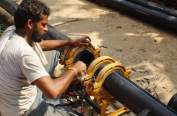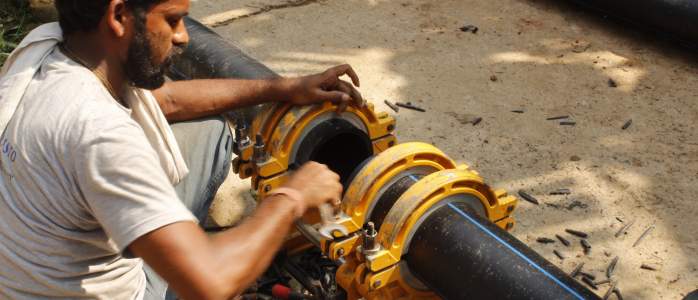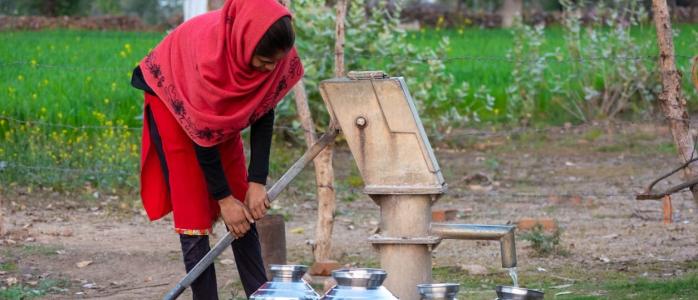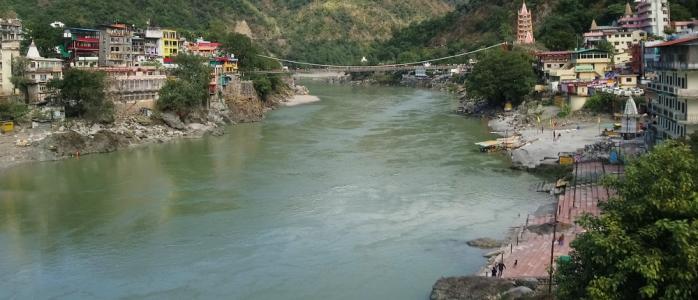



Access to safe drinking water and sanitation is a fundamental right and essential for human well-being. But women and girls across the world spend around 200 million hours daily fetching water (UNICEF 2016). Also, they are more likely to experience poor hygiene and sanitation, which can increase the risk of disease and infection, particularly in rural areas. Further, the unequal distribution of water resources in India limits women's participation in income-generating activities and perpetuates the cycle of poverty and disempowerment (UNICEF 2016). As a result, the issue of access to water in India is not just a matter of infrastructure or resource, it is a gender issue.
The Jal Jeevan Mission launched by the Indian government is a welcome step in this direction, which aims to provide every rural household with a functional water tap with special emphasis on inclusivity (Department of Drinking Water and Sanitation 2021). However, data and information regarding access to safe drinking water services is still a major issue (Bassi et al. 2022). Despite this, the impact of the Jal Jeevan Mission (JJM) cannot be underscored. We analyse the role of JJM in empowering women through improved access to safe drinking water.
Empowering women in rural India
The Jal Jeevan Mission was launched in August 2019. Before this, the National Rural Drinking Water Programme (NRDWP) was operational. Both JJM and NRDWP aim to address the issue of water scarcity in rural areas, but their approach and implementation concerning the involvement of women differ significantly.
JJM mandates that at least one-third of the village water and sanitation committee (VWSC) members should be women, but the NRDWP does not specify any such criteria and simply mentions the need to promote their participation. JJM drives women's participation by focusing on their priorities in decisions concerning new water supply schemes. NRDWP had no such provision.
JJM intends to provide the necessary knowledge and skills to women to manage and maintain water supply systems. Further, it provides opportunities for them to participate in income-generating activities related to water supply. NRDWP did not have such a specific focus.
Overall, JJM clearly recognises the specific challenges that women face in accessing safe and reliable water supply and has taken steps to address these challenges. Further, the Mission has positioned women at the centre of India’s water supply planning, with a strong focus on their engagement and involvement in decision-making.
Was JJM a success among women?
Since the launch of the mission, there has been significant improvement in the access to functional household tap connections (FHTCs) in rural areas of India, with 60 per cent of households having tap access as of March 2023, compared to 17 per cent in 2019 (Department of Drinking Water and Sanitation 2022). The provisioning of piped water supply has reduced the physical burden of collecting water on women and girls, allowing them to engage in income-generating and productive activities, pursuing education, and having more personal time (Shukla 2022).
The availability of clean water has also had a positive impact on the health and well-being of women, reducing the risk of water-borne diseases. As per the results from the recent functionality assessment, 98 per cent of the households with piped water supply did not report any incidence of water-borne diseases in one last year (Department of Drinking Water and Sanitation 2022). Further, the Mission has helped promote hygiene and sanitation practices in rural areas, and has had a positive impact on children's education, particularly for girls.
Way forward
Two decades worth of studies have concluded that there are substantial improvements in leadership, transparency and sustainability of water supply when men and women are equally involved, compared to cases in which women are marginally or not involved at all. In fact, a World Bank analysis showed that simply involving women can increase the effectiveness of water projects by six to seven times(Kuriakose et al. 2005).
First, women should be at the centre of all water-related plans, not just JJM. Their presence is crucial in the planning, implementation, and maintenance of water schemes, especially in rural India. This is also because women are the primary users and managers of water resources, and their participation is essential for the success and sustainability of any water programme.
Second, JJM can provide capacity building and train local women in water management and governance. While JJM has taken several steps to ensure women’s participation, there are areas where the Mission can further enhance the outcomes. It can train to women to enhance their knowledge and skills in water management and governance. For instance, offering workshops and courses on water conservation that include training on the efficient use of water, rainwater harvesting, and water treatment and reuse.
Finally, JJM could offer mentorship and leadership training programmes to help women build the skills and confidence necessary to become effective advocates and decision-makers in water governance and management. This could include training on public speaking, advocacy and coalition-building skills, as well as providing opportunities for women to network with other women leaders in the water sector. Further, the Mission can foster partnerships with women's organisations such as local self-help groups (SHGs) to leverage their knowledge and expertise in promoting sustainable water management on the ground.
Sustaining the outcomes of JJM requires a long-term commitment to community ownership, capacity building, financing, technology and innovation, and monitoring. By adopting a multi-faceted approach that addresses these various factors while keeping the gender lens in focus, JJM can ensure that India’s water supply systems are sustainable and meet the needs of local communities first.
Upasena Negi and Kartikey Chaturvedi are consultants, and Nitin Bassi is a programme lead at the Council of Energy, Environment and Water (CEEW), an independent, not-for-profit research organisation. Send your comments to [email protected]







Add new comment